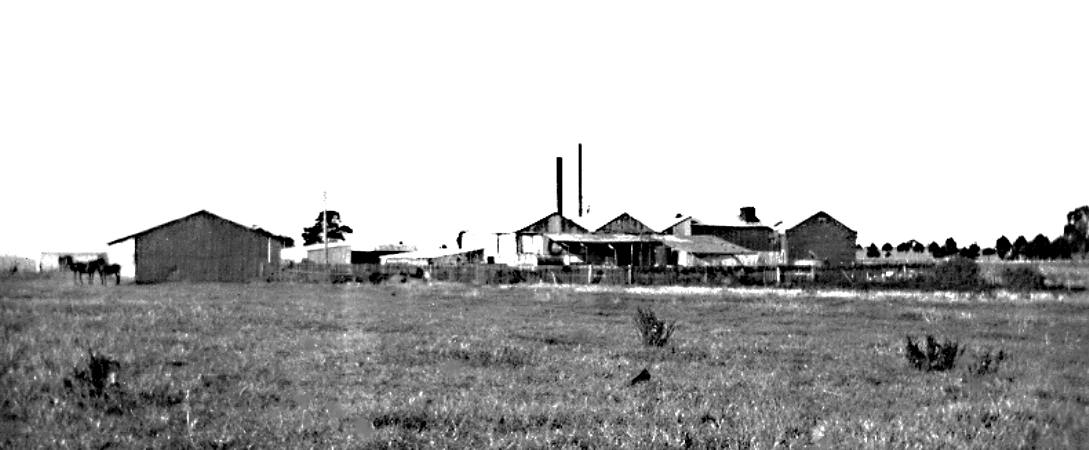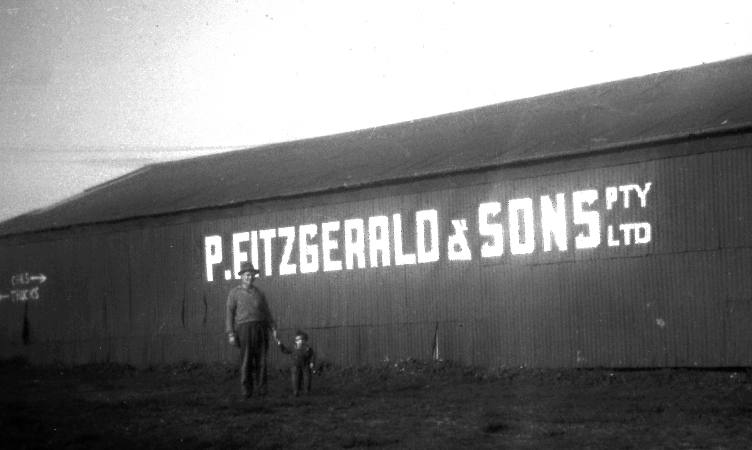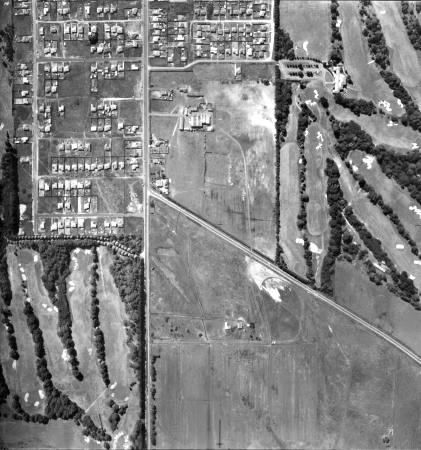A Noxious Industry

P Fitzgerald and Sons Pty Ltd, South Oakleigh, looking at the complex from Old Dandenong Road. Courtesy F Fitzgerald, Jnr.
Many of the early arrivals in the infant town of Melbourne sought their livelihood as market gardeners, supplying vegetables and fruit to the growing population. To achieve this objective they moved with their families east and south of Dendy’s Special Survey at Brighton to land that today is named East Bentleigh, South Oakleigh, Moorabbin, Cheltenham or Heatherton. In the mid to late 1800s this land was lightly wooded, relatively flat and with soil that was sandy and pliable. However, a major deficiency of the soil was its lack of fertility. To resolve this problem many early gardeners resorted to the use of human waste, or animal manure loaded and carted on the return journey from the Melbourne market to be deposited in the paddocks and ploughed in. Another option was to use artificial manure, blood and bone, manufactured in bone mills from dead animals or waste from local butchers.
The practice of using human effluent to promote the growth of vegetables and the granting of permission by local councils to construct and operate bone mills and knackeries received strong criticism from some members of local communities. The practice of using nightsoil was seen as being detrimental to health and the stench was offensive to the nostrils. [1] The presence of a noxious industry in the form of a bone mill was also seen to be a restraining factor on land prices. In fact, one writer in the local paper claimed that where a bone mill had been erected in the district the value of land surrounding it had depreciated by forty percent. [2]
From 1886 the issue of granting licences to noxious trades was a reoccurring item at meetings of Moorabbin councillors. Henry Dale was challenged for conducting a bone mill without a permit in Warrigal Road, East of Centre Road in the Shire of Moorabbin, and taken to court. Dale agreed he was operating a bone crusher and had been doing so for some time but he was unaware this was an illegal business. Despite the pleading of his lawyer he was fined £2 and £3 3s costs, with the alternative of spending 14 days in gaol. [3]
Two months later a reporter from the Brighton Southern Cross wrote in support of a licence being granted to Mr Dale to operate a bone mill. He explained he had visited the site of the mill and was surprised to find that the place was isolated, in the centre of hundreds of acres of heath land and not surrounded by habitations as he anticipated. The nearest house was half a mile away. The premises he said were clean and “sweet as was consistent with the nature of the trade carried on” and were better than some restaurant kitchens and butchers he had visited. He did agree that to some people there was a disagreeable smell of bone dust, a smell that was similar to that experience when passing a produce store. However, in his view the industry had to go somewhere, and the manure was much more valuable than nightsoil and less offensive. [4]
There was a difference of opinion amongst the Moorabbin councillors. Cr Abbott said they had a duty to encourage the industry and to him it seemed those opposing granting the licence were inconsistent as they were the very same people using nightsoil. Cr Ward reminded his colleagues that people were not objecting to the bone crushing but to the boiling down. Cr Reynolds found himself in a dilemma as he did not wish to oppose the licence but he could not go against the petition received from opponents. Consequently, he would vote against the granting of a licence. Five other councillors joined him ensuring that the licence was not granted. [5]
At the Cheltenham Police Court action was taken against Mr Dale for operating a business in East Brighton without a licence. Once again the problem of the smell that permeated the district was raised.
During crossing examination it was explained that the bones had to be boiled before they could be crushed and it was this cooking process that created the objectionable disgusting odour. One witness reported that when he visited the mill the fires were on and ‘stuff’ was being boiled but he didn’t know what was in the boilers. He could not swear that bones were being cooked. It was suggested that it may have been food for the pigs that were kept on the premises. The Bench, after discussion, dismissed the case on the ground that no evidence had been produced that the officer who had laid the information had been properly appointed; nor was there any evidence that the person who laid the complaint lived in the district. No costs were allowed. [6]
Mr Reid, a solicitor, approached the council in June 1886 on behalf of a client who sought a licence for a bone mill. On that occasion the request was rebuffed because the appropriate processes had not been observed. [7] In the following month Mr Reid again made application for a bone mill license for Mr Todd. Cr Ward spoke against the granting of the licence pointing out that the council had received a petition signed by a large number of individuals opposing the granting of a licence. During the course of the debate he also asked the rhetorical question of his colleagues from other ridings, “How many would like it when after finishing their meal and throwing open windows to be caught flop with the most damnable stink that sickens the stomach?” [8] Finally the request was denied when the president used his casting vote to defeat the proposal.
In 1888 Patrick Fitzgerald, with wife and two young children, took up land north of Dale’s factory in Warrigal Road with the intention of conducting a market garden. This proved to be impossible due to the unsatisfactory nature of the soil. Instead he set himself up in a ‘boiling down business’. Although experiencing three fires the business succeeded and became known as P Fitzgerald and Sons.

Sign on building of P Fitzgerald & Sons Pty Ltd c1960. Courtesy Frank Fitzgerald Jnr.
The problem of ‘stench’ continued. The Oakleigh Council wrote to their Moorabbin Council counterpart in December 1906 asking that steps be taken to abate the offensive odours emanating from noxious trade establishments on Warrigal Road. The Oakleigh Council claimed that when a cool breeze sprang up from the south after hot weather, the residents were unable to open their windows and doors to take advantage of the change owing to the abominable stench carried on the breeze. Mr Dale indicated to the Inspector of Nuisances that the processes used at his premises had been modified. He had bought a “presser” and instead of drying the material, it was left in the vats for some time and then put through the presser. When all the liquid was pressed out the dry material was ground up and turned into bone dust within twenty four hours. While Dale may have thought the problem had been resolved he was wrong. [9]
The Board of Health was writing to the Moorabbin Council in August 1907 requesting that action be taken against Messrs Dale and Fitzgerald of East Brighton in relation to the noxious trades they were conducting. Earlier a report by the Inspector of Nuisances had been sent to the Board indicating that the proprietors of the works were taking steps to mitigate the nuisance. This the Board said was unsatisfactory. They wanted stronger action including the threat of a penalty. They saw the inspector’s report as useless and a waste of time. What was wanted, they suggested, was a certificate from the officer of health that the businesses were a nuisance and a threat to health. With such information there was a greater possibility that the businesses could be closed down.
Some of the councillors took exception to the intrusion of the Board of Health. Cr Mills thought the Board was going too far and the objections were not coming from residents. On the other hand, Cr Small believed the council was not being consistent in its actions as they allowed these establishments in the district yet they objected to piggeries. These establishments he said sent a smell for miles around, and included piggeries, boiling down, bone dust, and all the horrible smelling manures possible to think of. Cr Ferdinando while acknowledging the Board’s letter was annoying, recognized that the Board had a statewide responsibility. Nuisance Inspector Butler informed the council that he had inspected the premises of both businesses and Mr Dale was spending, £1300 in improvements and Mr Fitzgerald was spending £1000 in a like manner .
Almost twenty years later several organisations were petitioning the Moorabbin Council to refuse a noxious trade licence to both N Dale and P Fitzgerald and Sons. The Oakleigh Development Company, the Yarra Yarra Golf Club and the Commonwealth Golf Club saw great potential in the land occupied by the two businesses but feared it could never eventuate whilst “the trade was carried on which was offensive and injurious, and the buildings an eyesore.” [10] Cr Castle was not sympathetic to the petitioners. The petitioners bought land very cheaply “with their eyes open”. Dale and Fitzgerald had been there for over forty years and came at a time when the place was uninhabited. He also pointed out that a portion of the Fitzgerald land had been purchased by the golf club. This stimulated Cr George to suggest that if the petitioners wanted the businesses closed down they should buy them out. They had the money he said, directing attention to the fact that the Yarra Yarra Golf Club had sold their links at Rosanna for residential sites at good prices. [11]
A few months later the Public Health Department forwarded to the council complaints about both Dale’s and Fitzgerald’s. The two golf clubs and the land development company, in what was described by some councillors as a sneaky act, made the complaints. The complainants had by-passed the council and gone straight to the government department. Dr Merrilees, the chief medical officer of the Department, in his report explained the process by which refuse from butchers shops was treated to make artificial manure. He said the only danger from a health point of view was if portions of refuse, such as blood, were left about. An inspection of the Fitzgerald’s premises showed them to be clean. He did recommend that as Dale’s knackery licence was about to expire it should not be renewed. Cr George pointed out that Dr Merrilees report in respect to Fitzgerald’s operation was favourable and suggested if council listened to these complaints they might have complaints lodged against all market gardeners in the Shire as they used artificial and stable manure in their paddocks. [12]

Aerial photograph showing P. Fitzgerald’s and Dale’s Knackery, in Warrigal Road, South Oakleigh. The Commonwealth Golf Club is top right and the Yarra Yarra Club bottom left, 1956.
A few years later a request from N Dale for a killing licence was once again before the council. Several councillors visited the property and viewed the corrugated iron sheds with concrete floors. They expressed concerned about the absence of appropriate drainage provisions. While they were strongly opposed to the issuing of a boiling down licence they were prepared to grant a knackers licence provided all the boiling down was carried out by Fitzgeralds and that provision was made for drainage. [13] At the end of 1931 P Fitzgerald and Sons applied for a noxious trade licence while N Dale requested a knackers licence. In both cases the usual fees were lodged and the licences were granted. [14] Four years later Dale’s of Oakleigh were advertising in the Chelsea News for old horses and cattle and offered to remove dead horses and cattle free. [15] P Fitzgerald and Sons continued to operate from their site in Warrigal Road, South Oakleigh for some years until they established new premises in Hammond Road, Dandenong. By agreement with the City of Moorabbin, the directors of P Fitzgerald and Sons accepted that its noxious trade licence would expire in June 1963 closing a local operation that had existed for eighty plus years on the one site. Frank Fitzgerald said, “Like other enterprises that began in open country the urban area has just caught up on us.” [16]
Footnotes
- Whitehead, G., Night Soil, Article 30, http://localhistory.kingston.vic.gov.au
- Brighton Southern Cross, February 27, 1886.
- Brighton Southern Cross, March 6, 1886.
- Brighton Southern Cross, May 8, 1886.
- Brighton Southern Cross, June 19, 1886.
- Brighton Southern Cross, July 10, 1886.
- Brighton Southern Cross, June 26, 1886.
- Brighton Southern Cross, July 31, 1886.
- Brighton Southern Cross, December 22, 1906.
- Moorabbin News, June 11, 1927.
- Moorabbin News, June 11, 1927.
- Moorabbin News, October 8, 1927.
- Moorabbin News, March 21, 1931.
- Moorabbin News, December 26, 1931.
- Chelsea News, July 13, 1935.
- Moorabbin News, June 5, 1963.
